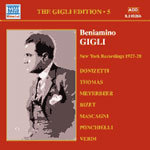
Beniamino Gigli: New York Recordings (Rec 1927-1928)
 $25.00
Out of Stock
$25.00
Out of Stock6+ weeks add to cart
Beniamino Gigli: New York Recordings (Rec 1927-1928)
Beniamino Gigli, tenor, with Amelita Galli-Curci, soprano. Various orchestras
[ Naxos Gigli Edition Vol 5 / CD ]
Release Date: Monday 1 March 2004
This item is currently out of stock. It may take 6 or more weeks to obtain from when you place your order as this is a specialist product.
"A wonderful issue, in all. The use of only two songs, which are used to round off the recital, helps the more substantial feel that the programme has. A very highly recommended snapshot of Gigli as he was in New York in the years 1927 and 1928."
-- Colin Clarke, MusicWeb, October 2004
With Victor's introduction of the electric process in 1925, the reproduction of voices and, particularly, of orchestral accompaniments improved markedly. As one would expect, there was an upsurge in record production as the new method found an eager public. The new system produced both an expansion of repertory and a desire to provide new, improved versions of some of the old acoustic best-sellers.
Among Gigli's experimental electrics are a two-sided version of the Lucia 'Tomb Scene' (Naxos 8.110264). The first of these comprises both the accompanied recitative, Tombe degl'avi miei and the ensuing cantabile, Fra poco a me ricovero. To fit this much material on a single twelve-inch makes for a rather hurried but still quite expressive disc. The second side contained the cabaletta, Tu che a Dio, here shorn of the transition between the two statements of the melody. Two years later this material was
re-recorded complete, with the addition of Pinza in the important phrases of Raimondo, and the Metropolitan Opera Chorus, the whole scene encompassed three sides. Edgardo was a rôle that Gigli sang 21 times at the Met, and it is one that suits his heart-on-the-sleeve approach especially well. The varied moods of the recitative are nicely differentiated, culminating in the beautiful mezza voce of the closing phrase before the final expansiveness: 'Tu delle gioie in seno, io, della morte'. Donizetti never wrote more expressively for a tenor than in Fra poco a me ricovero, and Gigli makes the most of it. This 1927 Tu che a Dio is particularly fine, enriched as it is with Pinza's plangent contribution.
In its advertising the Victor Red Seal line had always featured combinations of the prominent singers of the day in various ensembles. The Lucia Sextet and the Rigoletto Quartet had sold well even at advanced prices and were obvious candidates for new electric versions. One of the convenient aspects of such a project was that the same four singers for the Verdi ensemble could serve, with the addition of a bass and a second tenor, for the Donizetti. These projects traditionally made a feature of the tenor, as the quartet begins with the Duke's solo, and Edgardo, along with the baritone Enrico, starts off the first section of the sextet.
What would be more natural then than to plan these new recordings around Gigli, currently the star Italian tenor of the Victor stable, and to use Galli-Curci, a veteran of the 1917 versions with the late Caruso (the soprano having proven herself in the intervening decade something of a gold mine for Victor). Louise Homer, then in her mid-fifties and even more of a veteran (her first Red Seals had been made in 1903), was currently (in 1927) enjoying a sort of postscript to her distinguished career. Giuseppe De Luca had sung the baritone parts with Caruso and Galli-Curci in Victor's last project with these ensembles in 1917. To these four were added the then-recent arrival in the United States, Ezio Pinza, and that prince of comprimarios, Angelo Bada.
Tracks:
GEORGES BIZET
Les Pêcheurs de Perles, Act I: Del tempio al limitar
AMILCARE PONCHIELLI
La Gioconda, Act I: Enzo Grimaldo, Principe di Santafior!
GAETANO DONIZETTI
Lucia di Lammermoor, Act III (Complete)
Lucia di Lammermoor, Act II: Chi mi frena in tal momento?
GIUSEPPE VERDI
Rigoletto, Act III: Bella figlia dell'amore
PIETRO MASCAGNI
Cavalleria rusticana: Viva il vino spumeggiante (Brindisi)
GIUSEPPE VERDI
La traviata, Act II: De' miei bollenti spiriti
AMBROISE THOMAS
Mignon, Act III: Ah, non credevi tu
Mignon, Act II: Addio, Mignon, fa core
GIACOMO MEYERBEER
L'Africaine, Act IV: O paradiso
ERNESTO DE CURTIS
Voce 'e notte
Canta pe' me



